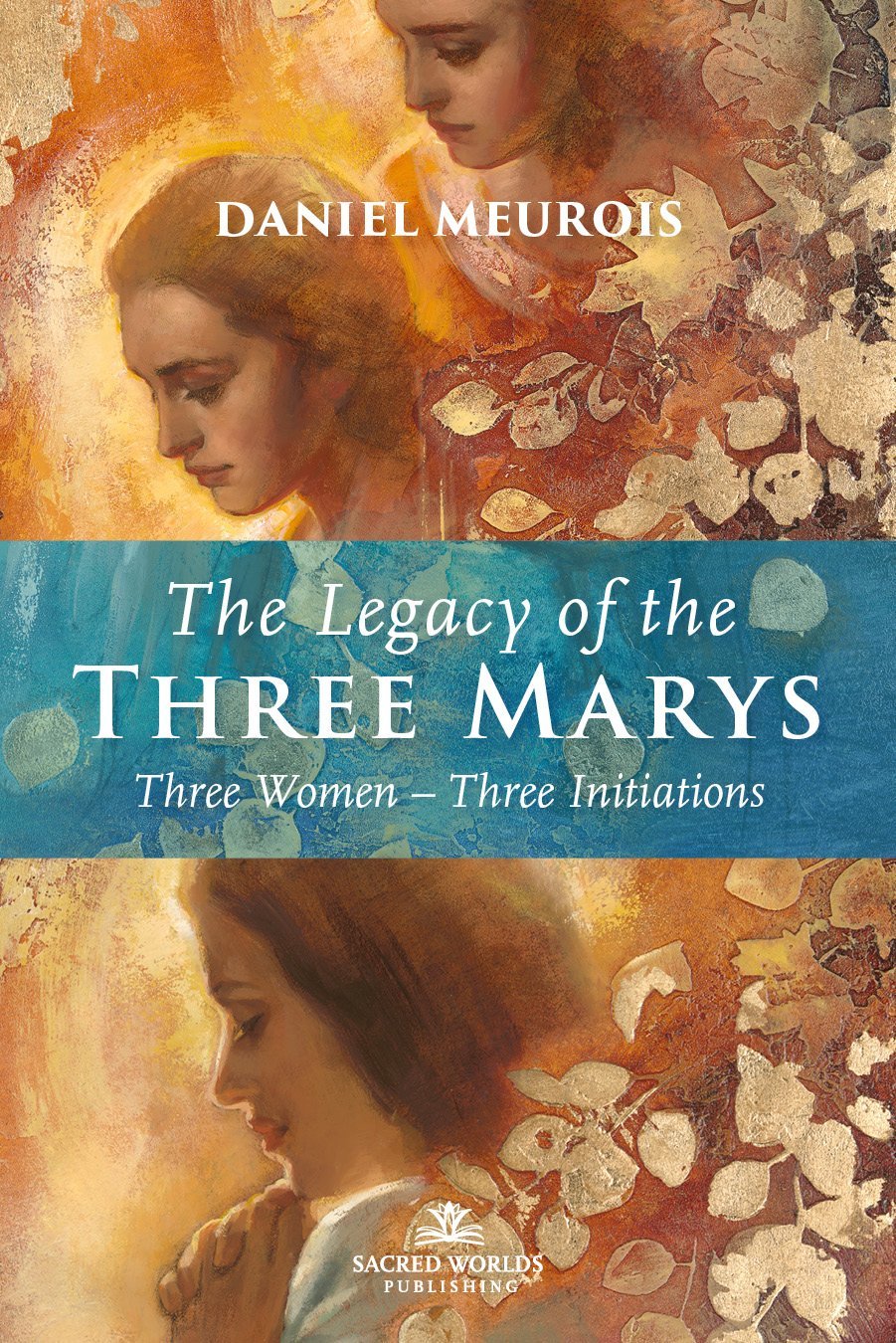The Legacy of the Three Marys by Daniel Meurois Interview with Sacrée Planète Magazine Part Two
The Feminine and the couple relationship
5_ The subtitle of your book is "Three Women, Three Initiations"...The fact is that Jacobe, Salome, and Mary Magdalene each experienced wounds in their femininity and had a couple relationship that was somehow suddenly interrupted, in opposition to what was acceptable at the time. Can you tell us about each of them? Don't they all represent a kind of archetype?
Daniel Meurois : Indeed, each of these women, by their wounds of the soul, their temperament, and their ordeals, has an archetypal value. At the level of suffering, Jacobe, for example, is sick of non-recognition. She expresses this through recurrent jealousy and inner violence against herself. Salome, assaulted at a very young age by a disreputable uncle, expresses the difficulties of incarnation, the fear of the body, and the lack of self-esteem. As for Mary Magdalene, she would rather illustrate impulsive rebellion and a form of subtle pride. In terms of assets, we can say that all three are remarkable for their tenacity, for their will to move forward to get out of their own impasses, for their lucidity, and finally for the quality of love that they seek to attain.
From a strictly human point of view, their common point is above all in their couple relationships, since all three left their husbands, which immediately marginalized them and made them socially what we would call today 'liberated' women, despite their respective inner prisons. They are therefore women of audacity who invite not only women of all times to refuse immobility and fatality, but also all human beings to take themselves in hand to manifest what is beautiful in them.
Obviously, the notions of "femininity" and "couple relationship" as we understand them today did not exist at the time as concepts; but that is the interest of their testimonies. They are in action and not struggling in the middle of psycho-sociological concepts. Their driving force is the need for true love, and for this, they go from challenge to challenge, from shedding their ego progressively. Their authenticity is their strength. They are certainly not "feminists" before their time, but simply fully feminine women who try to take their place, who play the role prompted by their hearts and who learn little by little to evacuate all the fears of their lives.
As I read through the Akashic Records, it became clear to me that all three were in their own way "in love" with the person of Master Jesus, as a fascinating human being and then as the archetypal perfect man, halfway between Earth and Heaven. Each of them thus came to nurture a bond of intimacy with Him, a bond that compensated in some way for their emotional disillusionment, while imbuing meaning to their existence. It is certainly "the Woman in the woman" that Christ knew how to seek in the depths of them.
6_ In the prayer of Schlomit - or of Salome - it is said: “Lord, lift me up and give me the strength to smile at the rain as well as the sun…”. Can you tell us about the choice of the term "Lift me up"?
Daniel Meurois:In truth, this expression was recurrent in the teaching of Christ to his close disciples. For Him, the notion of verticality was inseparable from any living approach to the opening of the heart and consciousness.
This verticality referred to another notion, that of the will. Without a will, there was, in his eyes, no love that could be strong enough to lead the being to his/her Liberation or - if we use the terms of the time - to his/her accession to the Divine Kingdom.
In his "Lift me up", we must understand: "Give me the strength to want". It is a call to perseverance, to tenacity...and also to active patience. I also see in this a reminder of the nobility of the human soul. The recovery in question is that of remembering one's Origin and Purpose. However, it must be understood that this notion of verticality to be regained in no way implied in the mouth of Christ a lack of interest in the horizontal expression of life.
The recovery called for is that which makes us aware of the respect due to life in all the directions in which it develops. At this level of perception, his "Lift me up" means "Place me in the center of the cross."
7_ Your book The Legacy of the Three Marys brings a particularly healing light on the Wounded Feminine Soul. Will the current opening of consciousness allow humanity to truly heal, or will this only happen in the intimacy of the heart of each being?
Daniel Meurois: Collective healing cannot be envisaged if there is no individual healing beforehand or - at least - if a certain critical mass of men and women who have taken a decisive step towards their own pacification of soul has not been reached.
It is a state of consciousness to be revealed within oneself, by which the ancestral reflexes that push to dominate, to enslave, to hoard, to control, etc., must cease. These are reflexes that are very anchored in human beings. In this field, our society - I should rather say our world - is still far from the goal to be reached, even if consciousnesses are opening up; we must recognize this and not tell beguile ourselves by dreaming of a golden age by tomorrow morning.
Our collective consciousness is still relatively nascent. If we want to change it, we have to look in our own backyard and clean it up. As far as the place of the feminine and its wounds is concerned, things have obviously changed a lot in the West in the last decades. It is a great step forward that has indeed been accomplished, but we must not forget that our West does not represent the world in its totality.
Have you observed, by the way, that in The Legacy of the Three Marys, the male characters - Chalphi and Zebedee - from whom Jacobe and Salome are freed to join Christ, are far from being domineering males? In fact, they are remarkable for their understanding, self-control, acceptance of the situation, and generosity. The testimony I have gathered in this regard does not insist on this aspect but perhaps it could one day lead to a reflection on the "Wounded Masculine".
8_ You speak very clearly of the marriage of Jesus and Mary Magdalene and thus of their life as a couple that was both human and sacred. Is this reading in the Akashic Records not able to participate in the healing of the wounds of the collective consciousness of humanity?
Daniel Meurois: Yes, I hope so! In my opinion, it is high time that our Judeo-Christian society reconsidered its views. The dichotomy widely maintained between the choice of life as a couple and committing oneself fully to a spiritual path has done much damage. With the clear affirmation of the marriage of Jesus and Mary Magdalene in The Legacy of the Three Marys, I hope to have contributed to moving things forward. This statement is culturally acceptable since in Judaism, rabbis–and Jesus was considered a rabbi in his time–were traditionally required to take a wife, which is still the case.
Some may find it scandalous that I was able to address the intimacy of the couple in a chapter devoted to the wedding at Cana, but entering this dimension was a must. The fact that the Akashic portal to this aspect of their lives was opened to me is also important.
It should be obvious that a couple's relationship can be lived in a sacred way until it becomes a real springboard for the soul. The principle of the "Bridal Chamber", which Jesus spoke of, and which is mentioned in the Gnostic writings also, is not only a symbol of the alchemy of the spirit. The space of the Bridal Chamber can become a concrete reality, that of a total reconciliation between the gross and the subtle, between the flesh and the Divine, the Creation, and the Creator.Its existence was part of the teachings Christ imparted to his most advanced disciples.
This means that Christ in the person of Master Jesus had sexuality and that there is no need to fear or to continue to hide it. On the contrary, the fact that he was totally human is wonderfully comforting, restorative, and extraordinarily teaching. It makes our human condition divinable; it undermines the mental barriers erected by the churches behind which a thousand frustrations, a thousand hypocrisies, and lies have grown.
The love that Jesus had for Mary Magdalene was the love he offered to the Woman as a Principle and as an incarnated reality. In doing so, he affirmed to the whole female gender its initiating function and to the couple, its possible determining role in the awakening of consciousness.
© 2022 Daniel Meurois





